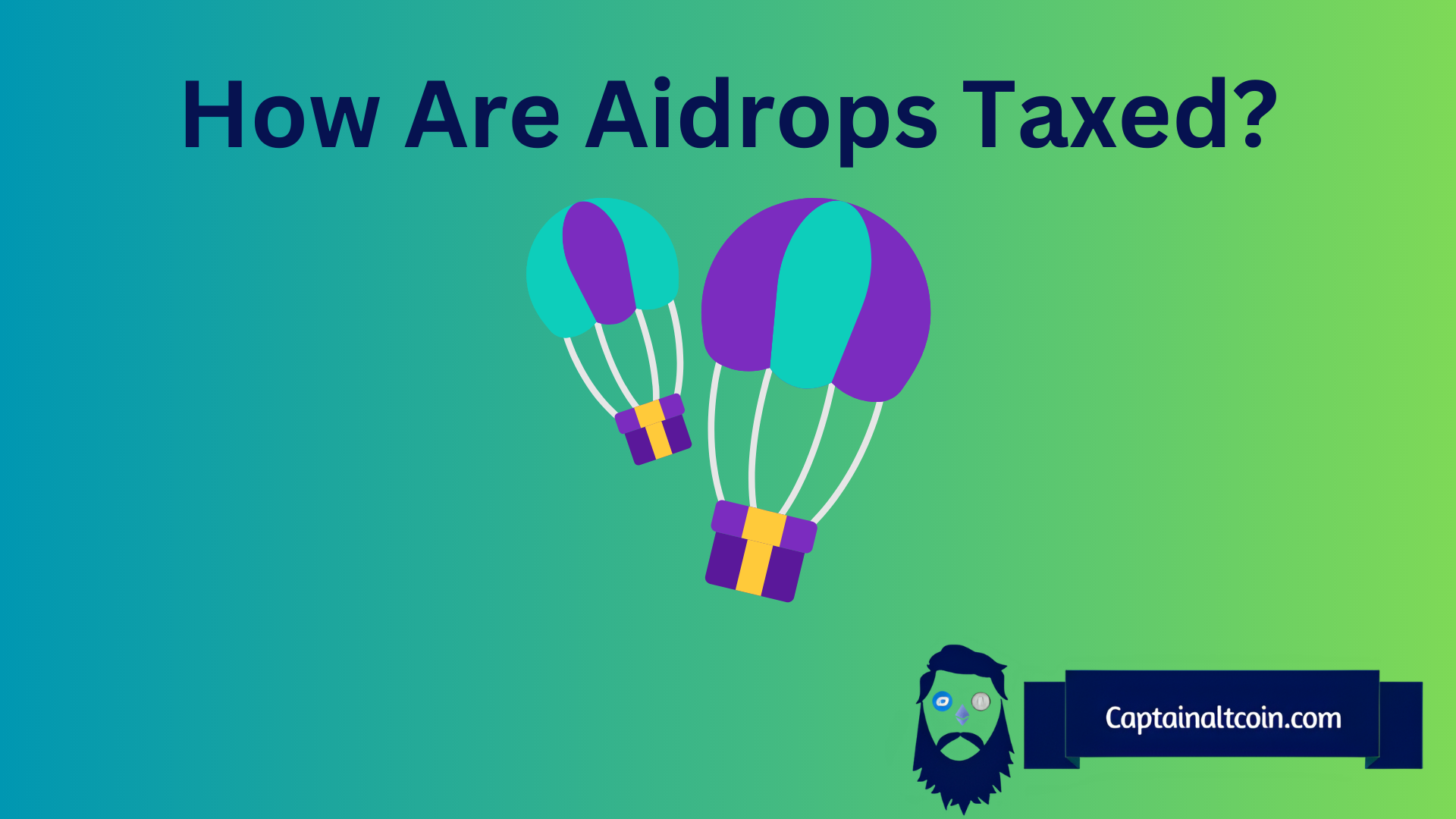
If you are an investor in the cryptocurrency space, you may have come across the term ‘airdrops’. Crypto airdrops are a popular marketing strategy used by blockchain startups to distribute free tokens or coins to users.
However, as with any form of income, airdrops are subject to taxation. Understanding the tax implications of airdrops is crucial to avoid potential penalties and ensure accurate reporting of your crypto investments.
In this article, you will learn how airdrops are taxed in different countries, including the US, UK, Australia, Canada, and Germany. We will explore the IRS guidelines on crypto airdrops, the taxable event, and the capital gains tax implications of airdrops.
Additionally, we will discuss the importance of record-keeping for accurate reporting and how you can use crypto tax software to calculate your taxes on airdrops. So, if you want to stay compliant and avoid any tax-related headaches, keep reading to learn more about how crypto airdrops are taxed.
| Topic | Explanation |
|---|---|
| 💰 Crypto Airdrops | Crypto airdrops are a popular marketing strategy used by blockchain startups to distribute free tokens or coins to users. |
| 📊 Taxation | Airdrops are subject to taxation. Understanding the tax implications of airdrops is crucial to avoid potential penalties and ensure accurate reporting of your crypto investments. |
| 🌎 Global Tax Treatment | The tax treatment of airdrops varies in different countries, including the US, UK, Australia, Canada, and Germany. |
| 📝 IRS Guidelines | The IRS treats airdropped tokens as ordinary income for tax purposes. The fair market value at the time of receipt is used to determine the income owed. |
| 💹 Capital Gains Tax | Airdrops are also subject to capital gains tax on any increase in value when sold, swapped, or traded. |
| ⚠️ Scams | Airdrop phishing scams are on the rise, so investors should be cautious when participating in promotional giveaways. |
| 🗂️ Record Keeping | Keeping accurate records of airdrops and their corresponding tax liabilities is important for accurate reporting and IRS compliance. |
| 💻 Crypto Tax Software | Crypto tax software can help simplify the process of calculating taxes for airdrops. |
| ❓ Airdrop Eligibility | Common criteria to qualify for a crypto airdrop vary depending on the distribution methods used by the crypto startup. |
| 🔄 Selling or Converting Airdrops | There may be restrictions on selling or converting airdropped tokens due to tax implications and market volatility. |
| 🏛️ Regulatory Landscape | Crypto airdrop regulations vary by jurisdiction, and it’s important to understand the legal implications before participating in an airdrop. |
| 📅 Long-term Capital Gains | If you hold onto airdropped tokens for over a year before selling, you may be eligible for long-term capital gains treatment. |
| 🛠️ Tax Optimization | Crypto tax software can help optimize your tax outcome through tax loss harvesting. |
What you'll learn 👉
Overview – Do you pay taxes on crypto airdrops?
Are you curious about how you could owe income taxes on free coins received through promotional giveaways? Let’s dive into the taxation of crypto airdrops.
Airdrops, which are free distributions of tokens to a large number of wallets, are a way for crypto startups to reward early supporters, gain new users, and attract media attention. While airdrops can be a valuable source of income for investors if the value of the new coin or token increases, they also come with a tricky tax situation since investors may acquire tokens against their will.
The IRS treats airdropped tokens as ordinary income for tax purposes, meaning income taxes are owed on new coins received in an airdrop. The fair market value at the time of receipt is used to determine the income owed, which applies even if holding the coins as a HODLer.

Airdropped coins are reported as taxable ordinary income, and this reported income becomes the basis for the new coins. This basis is used to calculate capital gains or losses when the coins are sold, swapped, or traded.
It’s important to note that airdrops are also subject to capital gains tax on any increase in value when sold, swapped, or traded. However, the taxable event is not crystal clear in cryptocurrency, so it’s recommended to speak to a crypto tax accountant and keep accurate records for IRS reporting.
Additionally, airdrop phishing scams are on the rise, so investors should be cautious when participating in promotional giveaways.
👉 Tax Treatment of Airdrops by Country
Well, isn’t it just lovely how different countries can have such unique and varied approaches to the taxation of these little freebies that magically appear in your digital wallets?
When it comes to airdrops, tax implications vary greatly by country, making it important for investors to understand the regulations in their respective jurisdictions. Airdrop scams and international regulations further complicate matters, making it crucial for investors to stay informed on the latest developments.
- In the US, airdrops are subject to income tax and capital gains tax. The fair market value of the tokens received at the time of the airdrop is considered income and must be reported to the IRS.
- In the UK and Australia, airdrops are also subject to income tax and capital gains tax.
- In Canada, airdrops are subject to capital gains tax.
- However, in Germany, airdrops are not considered income and are tax-free.
It is important for investors to consult with a tax professional to understand the tax implications of airdrops in their respective countries.
✍️ IRS Guidelines on Crypto Airdrops
The IRS has established guidelines regarding the taxation of free digital tokens distributed by crypto startups, and it’s important to understand the regulatory landscape for these promotional offerings.
According to IRS guidance, airdropped coins are considered taxable ordinary income, even if the recipient did not request them. This means that income taxes are owed on any new coins received in an airdrop, and the fair market value at the time of receipt is used to calculate the income owed.

Reporting requirements for airdropped coins are also important to keep in mind. Airdropped coins must be reported as taxable ordinary income, and the reported income becomes the basis for the new coins. This basis is then used to calculate capital gains or losses when the coins are eventually sold.
It’s essential to keep accurate records and report any airdropped coins on tax returns, and consulting with a tax professional or using crypto tax software can help ensure compliance with IRS guidelines.
⚡️ Taxable Event
Receiving free digital tokens through promotional offerings can result in owing income taxes, as it’s considered a taxable event by the IRS.
This means that the fair market value of the airdropped tokens at the time of receipt is included in the recipient’s income for tax purposes.
It’s the responsibility of the investor to keep track of any airdrops they may have received and report it on their tax return.
Due to the constantly evolving regulatory changes in the crypto world, it’s important for investors to stay informed of the tax implications of airdrops.
While some may see airdrops as a way to get free tokens, it’s important to consider the potential tax consequences.
To avoid any issues with the IRS, it’s recommended to consult with a tax professional and use crypto tax software to accurately report any airdrops and their corresponding tax liabilities.
📲 Capital Gains Tax on Airdrops
You may be surprised to learn that if you sell, swap, or trade those free tokens you received, you could be subject to capital gains tax, even if you didn’t actively seek out the airdrop.
The IRS treats airdropped tokens as ordinary income for tax purposes, and selling them may trigger a capital gain or loss.
However, if you hold the airdropped tokens for over a year before selling, you may be eligible for long-term capital gains treatment.
To accurately calculate gains and losses on airdropped tokens, you should keep accurate records of their fair market value at the time of receipt, as well as any subsequent transactions involving those tokens.
It’s also important to be aware of airdrop scams and to only participate in legitimate airdrops.
Long-term holding of airdropped tokens may also be a wise strategy for minimizing taxable events and maximizing gains.
Overall, careful consideration of tax implications is necessary when participating in crypto airdrops.
Importance of Record Keeping
It’s crucial to keep accurate records of the fair market value of any tokens received through promotional giveaways, and to stay organized with subsequent transactions, in order to fully understand the impact on your taxes.
Poor record keeping can lead to underreporting income or overreporting losses, which could result in penalties or interest charges. Here are some record keeping tips and best practices for tracking airdrops:
| Record Keeping Tips | Best Practices for Tracking Airdrops | Potential Consequences of Poor Record Keeping |
|---|---|---|
| Keep detailed notes of airdrop dates, fair market value, and any associated transactions | Use a crypto tax software to automatically track airdrops and integrate with exchanges | Underreporting income or overreporting losses, resulting in penalties or interest charges |
| Store records securely, and keep backups in case of data loss | Separate airdrop income from other income, and keep accurate records of taxable events | Difficulty in accurately reporting taxes, and potential issues during audits |
| Consult with a tax professional for guidance on reporting requirements and best practices | Keep up to date with regulatory changes and tax laws related to cryptocurrency | Missed opportunities for tax optimization, and potential legal issues related to inaccurate reporting |
By following these best practices for tracking airdrops and keeping accurate records, you can ensure that you are fully compliant with tax laws and regulations. It also allows you to optimize your tax outcome and avoid potential penalties or interest charges related to poor record keeping. Don’t underestimate the importance of record keeping when it comes to airdrops and other forms of cryptocurrency transactions.
Using Crypto Tax Software
Using tax software is crucial for accurately reporting and optimizing your cryptocurrency taxes, ensuring compliance with regulations, and avoiding penalties or interest charges.
With the constantly evolving regulatory landscape for cryptocurrencies and airdrops, it can be challenging to keep up with the tax implications of receiving an airdrop. Additionally, airdrop scams are on the rise, making it even more important to have accurate records and use reliable tax software.
Crypto tax software, such as Accointing, can help simplify the process of calculating taxes for airdrops. Accointing’s software integrates with various exchanges and wallets, making it easy to track airdrop income and capital gains separately.
The platform also offers tax loss harvesting, which can help optimize your tax outcome. Furthermore, holding airdropped tokens for longer than a year can qualify you for long-term capital gains treatment, resulting in a lower tax rate.
Using reliable crypto tax software can help you stay organized and ensure accurate reporting, ultimately saving you time and money.
FAQs
Conclusion
So, there you have it – an overview of how crypto airdrops are taxed in various countries. While the tax treatment may differ depending on your location, it’s important to keep detailed records of all your airdrops and seek professional advice to ensure accurate reporting.
Remember, airdrops are considered taxable events and may be subject to capital gains tax. Understanding the tax implications of airdrops is crucial for any crypto investor looking to stay compliant and avoid potential penalties.
Don’t let the murky waters of crypto taxation scare you away from participating in airdrops – just make sure you’re prepared to report them accurately and seek professional advice when necessary. As the crypto industry continues to evolve, staying informed about tax regulations is just one more step towards successful investing.







